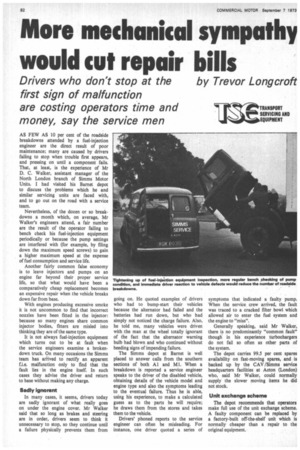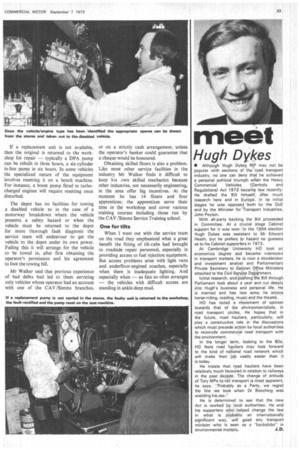More mechanical sympathy would cut repair bills
Page 84

Page 85

If you've noticed an error in this article please click here to report it so we can fix it.
Drivers who don't stop at the first sign of malfunction are costing operators time and money, say the service men by Trevor Longcroft
AS FEW AS 10 per cent of the roadside breakdowns attended by a fuel-injection engineer are the direct result of poor maintenance; many are caused by drivers failing to stop when trouble first appears, and pressing on until a component fails. That, at least, is the experience of Mr D. C. Walker, assistant manager of the North London branch of Simms Motor Units. I had visited his Barnet depot to discuss the problems which he and similar servicing units are faced with, and to go out on the road with a service team.
Nevertheless, of the dozen or so breakdowns a month which, on average, Mr Walker's engineers attend, a fair number are the result of the operator failing to bench check his fuel-injection equipment periodically or because the pump settings are interfered with (for example, by tiling down the maximum speed screws) to gain a higher maximum speed at the expense of fuel consumption and service life.
Another fairly common false economy is to leave injectors and pumps on an engine far beyond their proper service life, so that what would have been a comparatively cheap replacement becomes an expensive repair when the vehicle breaks down far from base.
With engines producing excessive smoke it is not uncommon to find that incorrect nozzles have been fitted in the injector: because so many engines share common injector bodies, fitters are misled into thinking they are of the same type.
It is not always fuel-injection equipment which turns out to be at fault when the service engineers examine a brokendown truck. On many occasions the Simms team has ariived to rectify an apparent fi,e. malfunction only to find that the fault lies in the engine itself. In such cases they advise the driver and return to base without making any charge.
Sadly ignorant In many cases, it seems, drivers today are sadly ignorant of what really goes on under the engine cover. Mr Walker said that so long as brakes and steering are in order, drivers seem to think it unnecessary to stop, so they continue until a failure physically prevents them from going on, He quoted examples of drivers who had to bump-start their vehicles because the alternator had failed and the batteries had run down, but who had simply not noticed the charge failure. Also, he told me. many vehicles were driven with the man at the wheel totally ignorant of the fact that the alternator warning bulb had blown and who continued without heeding signs of impending failure.
The Simms depot at Barnet is well placed to answer calls from the southern sections of both Al and MI. When a breakdown is reported a service engineer speaks to the driver of the disabled vehicle. obtaining details of the vehicle model and engine type and also the symptoms leading to the eventual failure. Thus he is able, using his experience, to make a calculated guess as to the parts he will require; he draws them from the stores and takes them to the vehicle.
Drivers' phoned reports to the service engineer can often be misleading. For instance, one driver quoted a series of symptoms that indicated a faulty pump. When the service crew arrived, the fault was traced to a cracked filter bowl which allowed air to enter the fuel system and the engine to "miss".
Generally speaking, said Mr Walker, there is no predominantly "common fault" though in his experience turbochargers do not fail so often as other parts of the system.
The depot carries 99.5 per cent spares availability on fast-moving spares, and is backed up by the CAV /Simms service headquarters facilities at Acton (London) who, said Mr Walker, could normally supply the slower moving items he did not stock.
Unit exchange scheme The depot recommends that operators make full use of the unit exchange scheme. A faulty component can be replaced by a factory-built off-the-shelf unit which is normally cheaper than a repair to the original equipment.
If a replacement unit is not available, then the original is returned to the workshop for repair — typically a DPA pump can be rebuilt in three hours, a six-cylinder in-line pump in six hours. In some vehicles the specialized nature of the equipment involves resetting it on a bench machine. For instance, a boost pump fitted to turbocharged engines will require resetting once disturbed.
The depot has no facilities for towing a disabled vehicle so in the case of a motorway breakdown where the vehicle presents a safety hazard or when the vehicle must be returned to the depot for more thorough fault diagnosis the service team will endeavour to get the vehicle to the depot under its own power. Failing this it will arrange for the vehicle to be towed in, after first obtaining the operator's permission and his agreement to foot the towing bill.
Mr Walker said that previous experience of bad debts had led to them servicing only vehicles whose operator had an account with one of the CAV /Simms branches, or on a strictly cash arrangement, unless the operator's banker could guarantee that a cheque would be honoured.
Obtaining skilled fitters is also a problem. Like most other service facilities in the industry Mr Walker finds it difficult to keep his own skilled mechanics because other industries, not necessarily engineering, in the area offer big incentives. At the moment he has 14 fitters and four apprentices; the apprentices serve their time in the workshop and cover various training courses including those run by the CAV /Simms Service Training school,
One for tilts
When I went out with the service team on the road they emphasized what a great benefit the fitting of tilt-cabs had brought to roadside repair personnel, especially in providing access to fuel injection equipment. But access problems arise with light vans and underfloor-engined coaches, especially when there is inadequate lighting. And especially when — as fate so often arranges — the vehicles with difficult access are standing in ankle-deep mud.








































































































































